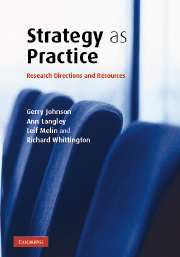12 - Reflections
Published online by Cambridge University Press: 10 March 2010
Summary
Collective reflections: looking back and looking forward
We began this book by inviting readers to consider strategy in a different way – as a practice – something people do, rather than something organizations have. Building on this foundation, we mapped in some detail the domain of the Strategy as Practice perspective, arguing that strategic activities carried out by organization members (i.e. the doing of strategy) both influence and are influenced by organizational-level actions and institutional-level practices, and that the greatest potential for developing new and valuable knowledge for the strategic management field lies in exploring and understanding these relationships (shown schematically in figure 1.1). We provided many examples of research questions that address the various linkages and drew attention to previous research that has begun to explore these issues.
The particular interest of the Strategy as Practice perspective lies, however, not only in its empirical relevance as described in chapter 1, but also in its theoretical richness. Thus, chapter 2 examined some of the most promising theoretical resources available for its development. We first located the perspective with respect to the ‘practice turn’ in philosophy and the social sciences generally. Then four broad theoretical traditions were identified as holding particular potential: the Situated Learning perspective; sensemaking and routine related views; institutional theory; and actor-network theory.
Chapter 3 then explored some of the methodological tools available for connecting empirical research questions with relevant theoretical frameworks. We discussed the particular challenges of approaching, bounding, capturing and understanding Strategy as Practice in empirical research. This chapter drew extensively on a series of illustrative papers that exemplify these research challenges and their potential solutions.
- Type
- Chapter
- Information
- Strategy as PracticeResearch Directions and Resources, pp. 207 - 221Publisher: Cambridge University PressPrint publication year: 2007

